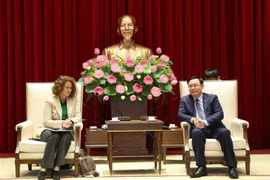 The Prime Minister's directive points out the worsening air pollution in many localities nationwide. (Photo: VNA)
The Prime Minister's directive points out the worsening air pollution in many localities nationwide. (Photo: VNA)The move aims to intensify the control of airpollution, ease its impact on people’s health and spur socio-economicdevelopment.
In a recently-issued directive, the Governmentleader emphasised the need to review law enforcement and the control of dustand emissions at industrial facilities as well as from transport andconstruction activities.
He also ordered the suspension of the facilitiesthat cause serious environmental pollution.
The directive pointed out the worsening airpollution in many localities nationwide, affecting socio-economic developmentand the public’s health, mainly due to dust and emissions by vehicles, andconstructional and industrial activities that are responsible for hugeemissions yet to be controlled effectively.
Moreover, tree coverage and water surface areas inurban development have not yet satisfied requirements, the document said,highlighting shortcomings in the implementation of relevant laws, programmesand tasks.
The PM asked the Ministry of National Resources andEnvironment to assess the realisation of the decision dated June 1, 2016,approving the national action plan on air quality control by 2020, with avision towards 2025, and the proposal on air quality control plans for2021-2025.
The ministry needs to enhance its management andorganisation of air quality monitoring programmes, announce results and swiftlyissue warnings of air quality to the public.
The PM also tasked the ministry with completingnational standards for emissions of industrial activities and vehicles.
Meanwhile, the Ministry of Transport must promptlyput forth national programmes and projects on the development of means oftransport, and the environmentally friendly public transport system.
People should be encouraged to use environmentally-friendlypublic transport vehicles, PM Phuc said.
The Ministry of Industry and Trade was asked tostrengthen its inspections over projects and factories with huge dischargesthat may cause environmental pollution, while devising policies in support ofbusinesses using clean energy and environmentally-friendly technologies.
The Ministry of Construction needs to guide andinspect the implementation of regulations and measures for dust and emissioncontrol in constructional activities, along with urban planning, with treecoverage and water surface area ensured.
The Ministry of Agriculture and Rural Development isin charge of supervising the collection and treatment of waste, and theprocessing of post-harvest by-products, while enhancing the communicationswork.
The PM asked the Ministry of Science and Technologyto issue national technical standards for fuels, and support relevantscientific-technological research studies.
He urged the Ministry of Health to assess the impactof air pollution on the public’s health, and propose measures for public healthprotection, while the Ministry of Finance was requested to inspect theimplementation of incentive policies on environmental protection in line withthe 2020 Law on Environmental Protection.
The Ministry of Public Security was requested toinvestigate and seriously handle violations of relevant laws.
The PM said cities and provinces need to build androll out planning schemes on local air quality monitoring networks, and pushahead with the issuance and realisation of plans on public transportdevelopment.
Vehicles that use clean energy should beprioritised, he said, stressing the need to revoke and terminate old andoutdated vehicles.
The localities should urge construction andtransport project investors and constructors to seriously observe environmentalprotection measures, and encourage production facilities to revamp outdatedmachines, he said./.



























